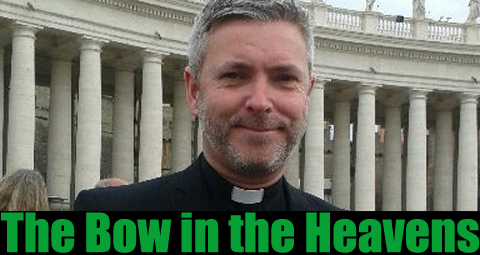October 20 | ![]() 0 COMMENTS
0 COMMENTS ![]() print
print

Building up the Kingdom at home and abroad
On its one year anniversary, THE BOW IN THE HEAVENS looks at the difficulty of returning to a parish — By FR JOHN BOLLAN
Well, dear reader, here we are celebrating The Bow in the Heavens’ first birthday: it’s been a rollercoaster of a 12 months and no mistake. I declined the editor’s offer of a drinks reception at Glasgow’s answer to Trump Tower (the ‘Observer’ offices) in favour of a quiet night in with the lady of the house.
In fact, I feel I ought to make a confession. Although this column is my principal commitment as a humble scribe, I do occasionally moonlight for another paper.
Every month or so, I contribute a notebook column to the ‘Observer’s’ sister paper, The ‘Catholic Herald’. Unlike the ‘Observer’, the ‘Herald’ is a glossy magazine and I don’t mind admitting that the thrill of seeing my name on the front page goes a long way to assuaging the hurt of getting a series of knock-backs in the past from ‘The People’s Friend’ and ‘The Sunday Post’ (I was this close to being the next Francis Gay).
In my latest ‘Herald’ column, which is also out today, I write about the experience of clergy moves from all sides, the priest, the people and even the bishop. This is meant to be a timely reflection since a lot of dioceses make their changes about this time. One aspect of changing parish (or parishes for that matter) which I didn’t go into is a very current one for me this week: how do you leave people behind?
By that I’m referring to the process of detaching yourself from the place and the people you lived amongst so as to devote yourself—hopefully with equal intensity—to the new flock which has been entrusted to your care.
While word of a priest’s move may have some folk grinning from ear to ear like lottery winners, others may be genuinely distressed. This is even more the case if you find yourself on the move with weddings and Baptisms in the pipeline.
But by far the most difficult challenge to deal with is that of funerals. In every parish you’re in, you get to know and love the people and, all being well, that affection is returned with interest. News of a death causes the heart to sink anyway, but doubly so if you are asked to do the funeral or simply want to be there in a gesture of prayerful solidarity with the grieving family.
The problem is two-fold. First, there’s that charism of bi-location we’d all love to have but don’t actually possess. Is it OK to leave your own people for the day, so as to return to your old parish? If, as often happens, you already have a funeral that day, then that puts an end to the matter. Problem solved, as it were.
But the other question is even trickier: where do you draw the line? If you attended the funeral of every person you liked, every soul who was ever kind to you, every tireless servant of the Church, in all likelihood you would seldom be away from your old stomping ground.
The danger is that, not only would your current parishioners become disgruntled, so would the families of those whose funerals you couldn’t attend. “Oh you made it to so-and-so’s Requiem but not to our dad’s?”
The words—and the hurt behind them—hit you like a blow to the solar plexus. A lot of the time, of course, the person beating you up about it is you.
I find myself in precisely such a situation just now, with the sudden death of a dear lady whom I’ve known for the better part of 25 years. Not that the least bit of moral pressure is being exerted upon me by anyone other than myself.
Margaret was one of the most generous people I have ever known, principally in the manner in which she radiated affirmation and love to everyone around her.
Although she wasn’t in the habit of sending me gifts, she recently sent me a CD of music from the Sistine Chapel Choir, recorded in the Chapel itself.
What makes the recording special is that the works are being performed in the acoustic space for which most of them were composed. I wrote to her not that long ago, a somewhat belated note of thanks, saying how lovely it was to see her at a recent happy occasion in the parish.
It’s awful to think I won’t see her again but the heart itself is a sort of acoustic space in which the love we receive from others resonates long after they have gone, as is surely the case with Margaret.
That doesn’t resolve my dilemma, however: if I manage to get to the funeral, I’ll content myself but at the probable cost of hurting others who may surmise that there exists a hierarchy of compassion or affection in me.
It goes without saying that that’s not the case, but even the possibility that it may appear that way is a painful one.
A less traumatic side of moving parish, but still an inconvenience, is redirected mail. Obviously, anyone who changes address has to go through this experience, but priests tend to attract more junk mail than most.
For months, even years, after you leave a chapel house, you may still be receiving vestment catalogues or desk calendars from that lemur sanctuary to which you made a one-off donation. Some poor soul, more often than not your successor, has to cope with the steady thud of bumf which has someone else’s name all over it.
It’s a fair bet, though, that he will have his own share of junk either lining the wastepaper basket or winging its way back through the postal system.
As I write this, we are waiting for the remnant of Hurricane Ophelia to strike. By happy coincidence, we have recently received the renewal notice for the church buildings’ insurance.
Apart from the eye-watering premium, it’s always fascinating to see how much your church is worth, or how much it would cost to rebuild it were an act of God to flatten it.
Of course, the bald figures don’t begin to capture the amount of time, sacrifice and prayer which goes into the building up of a church community.
Part of the work of our local Synod, as I have mentioned several times now, is to rebuild the Church in our diocese.
The reconstruction must begin at parish level and here, I think, we still have work to do. Responses to the ‘Doing My Bit’ appeal last week have been more of a trickle than a deluge. To be fair, though, the fact that a certain sacristan mistook the returns boxes for recycling material may not have helped. On the plus side, it does suggest that Matthew is taking the whole recycling thing a bit more seriously than before.
I suppose it’s fortuitous that we celebrate Mission Sunday this weekend. Although Missio Scotland is inviting us this year to pay particular attention to the Church in Uganda, we remember that the very nature of the Church is missionary. We are all ‘sent out’ to share our Faith with others and if we are reticent about doing so, it suggests that we need to be looking a little closer to home this year.
For, as some of our bishops have readily acknowledged, Scotland is mission territory. The presence in our midst of so many priests, Sisters and Brothers who hail from former ‘mission lands’ is a timely reminder of this.
Disciples are more like boomerangs than arrows: rather than being fired off into the distance, they return rejoicing (Luke 10:17). The missionary sweep of the Church has brought these disciples back to us, to enrich our parishes with the enthusiasm of the Gospel.
Let’s hope they will inspire us to re-engage with the one mission of the Church and that each of us will be encouraged to ‘do our bit’ to build up the Kingdom at home and abroad.











